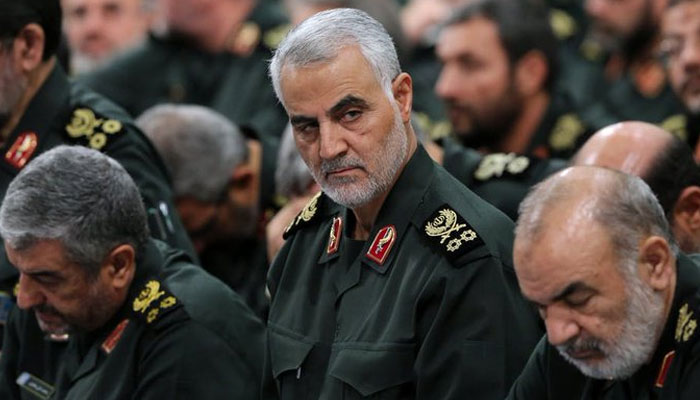Pakistan likely to face more pressure if US-Iran tension escalates
Pakistan is likely to come under pressure if tension between the United States and Iran flares up further and efforts to cool off the crisis fail. Washington and Tehran are embroiled in overt confrontation after the droning of very important Iranian General Qassem Soleimani, the head of IRGC force—architect of Tehran’s regional proxy and “grey” warfare spreading from Iraq to Lebanon to North America—by the US forces in Iraq.
Following Iran’s missile attack on the US bases operating out of Iraq, Washington apparently heaved a sigh of relief as there were no US casualties reported so far. Tehran also indicated it did not want to escalate further. At the moment, Washington is also signalling to Iran it does not want further escalation though President Trump sounded tough through optics if not in kinetic terms. Tehran may still seek to engage the US, its allies and assets through proxy warfare. Any further direct or indirect escalation has negating bearing on Pakistan and the region.
Pakistan’s dilemma is: neither it can side with the US and its allies as it will have far reaching consequences for its security and stability, nor it can side with Iran as it will enormously damage its strategic, economic and other relations. Even a theoretical possibility of military cooperation with the US against Iran, is a nightmarish scenario in terms of a rational foreign policy choice. The ISPR’s clarification rightly rubbished reports that Islamabad has extended any tacit support to Washington against Tehran.
Since the killing of Iranian general, Pakistan is at pain to send out a message of overt neutrality: Pakistan’s Foreign Office’s response was very terse and bureaucratic—only referring to “events in Iraq” eschewing any reference to the killing of Iranian general.
The ISPR underlined the same narrative: “we are neutral; Americans want our “neutrality” that means we will not be overtly pro Americans. It means Pakistan will not send army and logistics to their support, nor allow its soil to be used.
Other important conversations were between Pakistani Army Chief with the US Secretary of State and US Defence Secretary. The gist of COAS Gen Bajwa’s advice was restraint.
Islamabad’s cautious response stems from its usual balancing act: keeping in view the sensitivities of its GCC partners, on the one hand, and also endeavouring not to annoy closed neighbour—Iran. It was easy to be neutral in the 1980s during Iraq-Iran war. But this time around, Islamabad’s foreign policy has a moment of unpalatable choices: it may be forced to choose sides between Iran and its opposing camp led by the US if low level conflict turns into full blown hostilities.
The timing is very crucial: two watershed events are upon us: the US presidential elections make it harder for any president to go for a full scale war. But Iran’s crippling economy and people’s misery are big reasons to force the Iranian government to escalate conflict with the US, its allies, like GCC countries, and pro-US elements in the region. Eventually, the US may reluctantly be forced to respond matching the next level of escalation as a result the world creeps into the mother of all wars; and starting a war is easy, finishing a conflict is difficult. Huge pressure will still likely come on Pakistan if the conflict becomes more overt and dangerous between Tehran and Washington whilst efforts for de-escalation fail. The limited option Pakistan has and with a limited window of opportunity to work with, is to help prevent escalation of present conflict into a large scale war between the US and Iran.
Unfortunately, Islamabad has little leverage with Iran, (i.e, the context of ties is, proximity factor as the only common denominator, for Tehran brings to the table, no money, no arms and no diplomatic clout at international stage etc). But Islamabad can influence Iran through Chinese leverage: China has entered West Asia as very important stakeholder with the impending US troops’ drawdown from Afghanistan and a new 25 years strategic agreement with Tehran, it does not want any conflict to impede expansion of the BRI project. Pakistan can join forces with Beijing and Russia in preventing the eruption of large scale war.
Islamabad also can use Saudi leverage with Washington to de-escalate as Riyadhwill equally be at the receiving end as a consequence of any US-led war against Iran at this stage when the KSA is focusing on economic revival and domestic reforms.
The foreign minister should be dispatched to important capitals to help calm increased tension in the region with other like-minded friendly countries. Islamabad is well placed simultaneously to speak to Tehran, Qatar, Saudi Arabia and the US.
Caught between a rock and a hard place, Pakistan’s strategic location brings another crisis on its doorstep: any miscalculation may lead to decades of negative ramifications for its security, economy and foreign policy to reel under.
The writer is a geopolitical analyst, a politician from Balochistan, and ex-adviser to the Balochistan government on media and strategic communication. He remained associated with BBC World Service. He is also Chairman of Centre for Geo-Politics & Balochistan.
-
 Why Nicole Kidman 'not Rushing' Into Love After Split From Keith Urban?
Why Nicole Kidman 'not Rushing' Into Love After Split From Keith Urban? -
 Benny Blanco's Dirty Feet In Debut Podcast Divide The Internet
Benny Blanco's Dirty Feet In Debut Podcast Divide The Internet -
 Jeffrey Epstein Blamed King Charles As Andrew Left Trade Enjoy Job
Jeffrey Epstein Blamed King Charles As Andrew Left Trade Enjoy Job -
 King Charles Asked To Lean On Princess Anne To Avoid ‘media Circus’
King Charles Asked To Lean On Princess Anne To Avoid ‘media Circus’ -
 Passenger Wins £10,000 Payout From Heathrow Airport After 100 Ml Liquids Dispute
Passenger Wins £10,000 Payout From Heathrow Airport After 100 Ml Liquids Dispute -
 Eric Dane's Costar Under Fire For Hurling Accusations At Him After His Death
Eric Dane's Costar Under Fire For Hurling Accusations At Him After His Death -
 Queen Camilla Greets The Paddington Bear At BBC’s 500 Words Grand Final
Queen Camilla Greets The Paddington Bear At BBC’s 500 Words Grand Final -
 Chinese Astronauts Finally Reveal Why Spacecraft Left Them ‘stranded’ For 437 Days In Space
Chinese Astronauts Finally Reveal Why Spacecraft Left Them ‘stranded’ For 437 Days In Space -
 Sinitta Makes Shock Admission About Marriage To Andy Willner Post Simon Cowell Heartbreak
Sinitta Makes Shock Admission About Marriage To Andy Willner Post Simon Cowell Heartbreak -
 Bill Gates Calls Ties To Jeffrey Epstein 'huge Mistake,' Reveals Past 'affairs'
Bill Gates Calls Ties To Jeffrey Epstein 'huge Mistake,' Reveals Past 'affairs' -
 Switzerland Announces One-time Compensation For Swiss Bar Fire Victims
Switzerland Announces One-time Compensation For Swiss Bar Fire Victims -
 Ryan Coogler Shares Thoughts About Building Community Of Actors Amid 'Sinners' Success
Ryan Coogler Shares Thoughts About Building Community Of Actors Amid 'Sinners' Success -
 Heidi Klum Gushes Over Diplo Collab 'Red Eye' Despite DJ Falling Asleep During Video
Heidi Klum Gushes Over Diplo Collab 'Red Eye' Despite DJ Falling Asleep During Video -
 Israel Behind Majority Of Journalist Deaths Worldwide, Watchdog Claims
Israel Behind Majority Of Journalist Deaths Worldwide, Watchdog Claims -
 'It Would Become A Circus' : Inside Jane's Turmoil For 'little Sister' Fergie Whose Hidden From The World
'It Would Become A Circus' : Inside Jane's Turmoil For 'little Sister' Fergie Whose Hidden From The World -
 Inside Cardi B's Real Feelings Related To Stefon Diggs Split Post One Year Of Romance
Inside Cardi B's Real Feelings Related To Stefon Diggs Split Post One Year Of Romance




